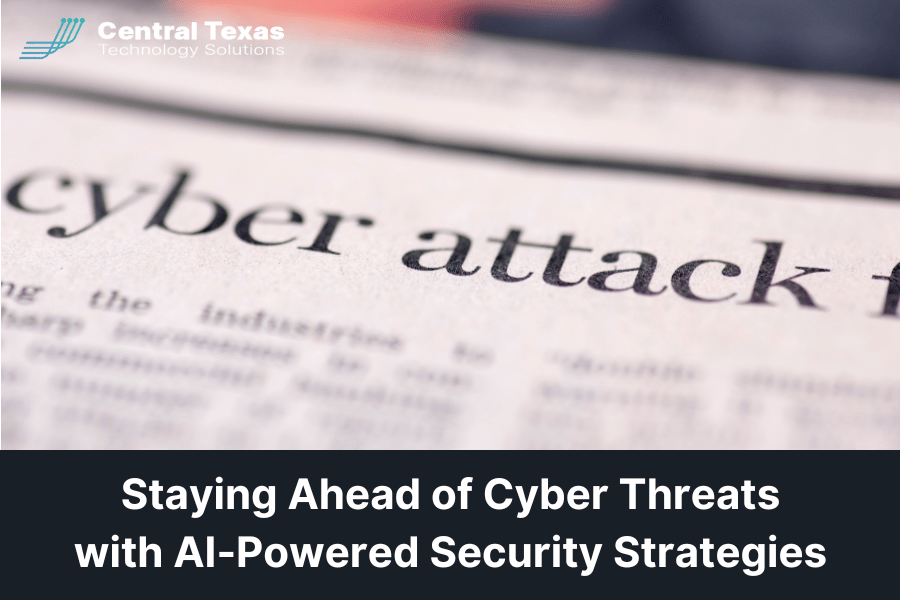
The Future of Cybersecurity Is AI-Driven
Cyber threats are evolving at an unprecedented rate, making traditional security approaches less effective against modern attacks. Businesses and security professionals must adapt quickly to stay ahead of cybercriminals who are leveraging artificial intelligence (AI) to develop more sophisticated hacking techniques.

At the same time, AI is also a powerful defense tool, helping security teams detect threats faster, automate responses, and fortify digital environments against breaches. The challenge lies in understanding how to use AI effectively while mitigating the risks it presents.
How AI Is Transforming Cybersecurity Strategies
AI is revolutionizing cybersecurity by offering faster, smarter, and more proactive defenses against cyber threats. Security professionals now have access to machine learning algorithms that can analyze vast amounts of data, identify patterns, and detect anomalies before they escalate into full-blown attacks.
Key AI-Driven Cybersecurity Capabilities
AI enhances cybersecurity in several ways, including:
- Real-Time Threat Detection: AI-powered systems continuously monitor networks, identifying unusual activities and flagging potential breaches before they cause damage.
- Automated Security Responses: AI can take immediate action against identified threats, reducing response times and minimizing risks.
- Predictive Analytics: By analyzing historical data, AI helps organizations predict potential attack vectors and strengthen defenses accordingly.
- Security Automation: AI reduces human workload by automating repetitive security tasks, such as log analysis and alert triaging, allowing security teams to focus on strategic initiatives.
- Adaptive Learning: AI-based security tools evolve over time, learning from past incidents to improve detection accuracy and response efficiency.
By integrating these AI capabilities into their cybersecurity frameworks, businesses can create a more resilient and adaptive security posture.
Challenges and Risks of AI in Cybersecurity
While AI strengthens cybersecurity, it also introduces risks that organizations must address. Failure to do so can result in new vulnerabilities that cybercriminals can exploit.
1. Data Protection and Privacy Risks
AI relies on vast amounts of data to function effectively, which raises concerns about:
- The potential exposure of sensitive information if AI models are not secured.
- Data integrity issues if AI misinterprets threats or fails to recognize malicious activity.
- Compliance challenges related to regulations like GDPR and CCPA, requiring strict data handling policies.
2. AI Misuse and Security Automation Risks
AI-powered tools can become a double-edged sword if they fall into the wrong hands. Potential threats include:
- AI-Powered Cyber Attacks: Hackers can use AI to automate phishing attacks, crack passwords faster, and bypass traditional security defenses.
- Manipulation of AI Models: If cybercriminals tamper with AI security systems, they could feed them misleading data, causing them to overlook real threats.
- Loss of Human Oversight: Over-reliance on AI can lead to a dangerous lack of human intervention in security decision-making.
To mitigate these risks, businesses must implement strict security protocols, continuously monitor AI-driven tools, and ensure human oversight remains an integral part of cybersecurity strategies.
The Path Forward: Embracing AI for a Secure Digital Future
AI is not just a trend—it’s the future of cybersecurity. As cyber threats become more sophisticated, AI-driven security strategies will be critical in defending against evolving attacks. However, organizations must take a balanced approach by:
- Investing in AI Security Training: Educating teams on how to manage and monitor AI-powered security systems.
- Combining AI with Traditional Security Measures: Using AI as an enhancement, not a replacement, for human expertise.
- Regularly Auditing AI Systems: Ensuring AI models are up to date and free from vulnerabilities.
With the right strategies in place, businesses can harness the power of AI to strengthen cybersecurity while minimizing risks.
FAQ: AI and Cybersecurity
1. Can AI completely replace human cybersecurity professionals?
No, AI is a powerful tool but cannot fully replace human expertise. AI enhances cybersecurity by automating tasks and detecting threats faster, but human oversight is still essential for decision-making and addressing complex security challenges.
2. How can businesses protect AI-powered security systems from cyberattacks?
Businesses should implement multi-layered security measures, including encryption, access controls, and regular audits. It’s also crucial to monitor AI models for tampering and ensure strict governance over data access and usage.
3. What industries benefit the most from AI-driven cybersecurity?
Industries with high data sensitivity, such as finance, healthcare, and government sectors, benefit significantly from AI-powered cybersecurity. AI helps these industries detect fraud, prevent data breaches, and enhance compliance with regulatory requirements.
Contact CTTS today for IT support and managed services in Austin, TX. Let us handle your IT so you can focus on growing your business. Visit CTTSonline.com or call us at (512) 388-5559 to get started!
